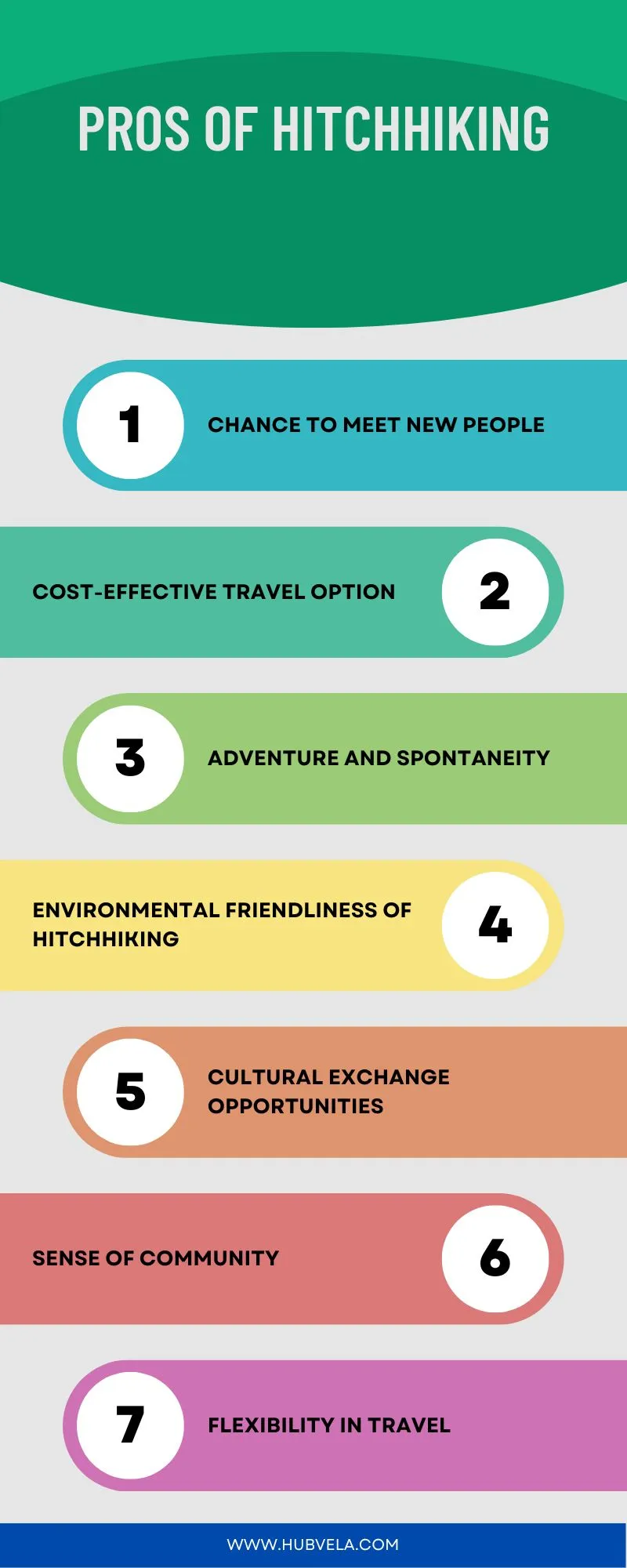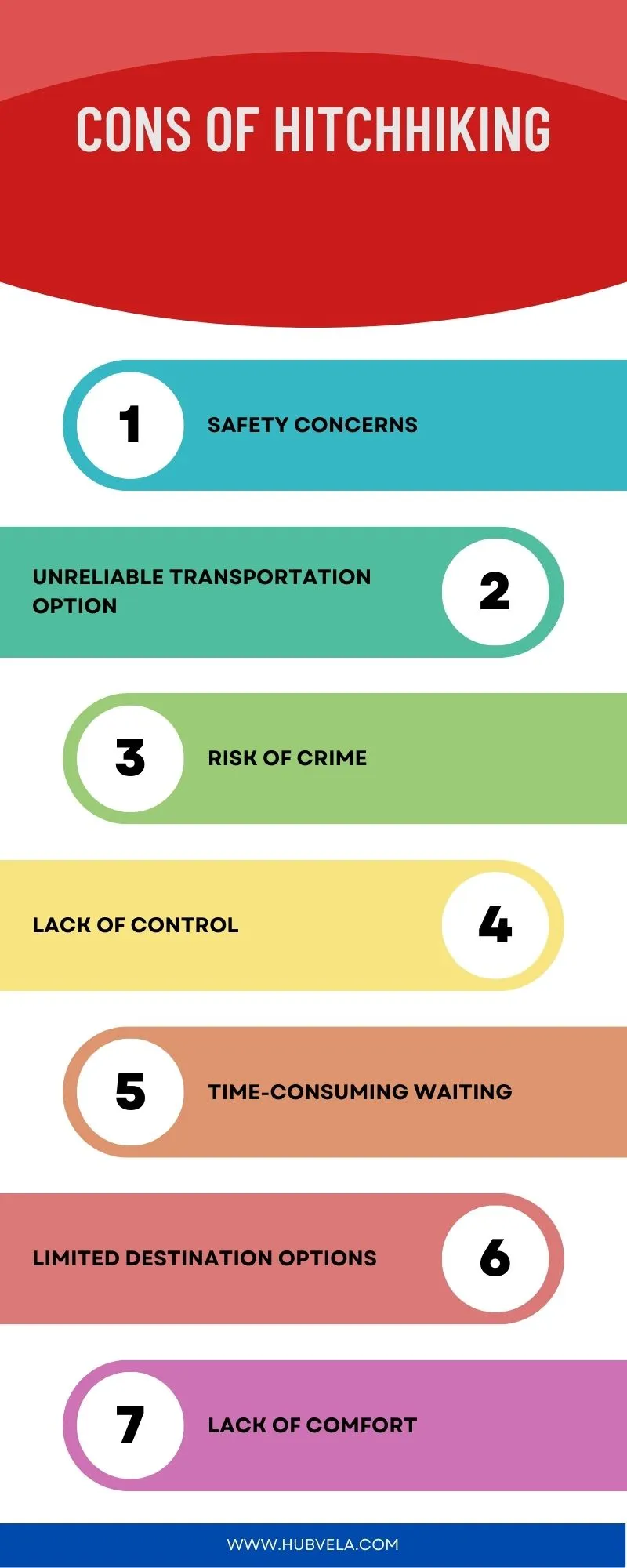Remember when hitchhiking was a common practice?
In today’s fast-paced world, the idea of sticking out your thumb and catching a ride with a stranger might seem outdated, but there are still valid reasons why people choose this mode of travel.
As you consider whether hitchhiking is a viable option for your next journey, it’s essential to weigh the pros and cons of hitchhiking carefully.
From the thrill of unexpected encounters to the potential risks involved, each aspect of hitchhiking presents a unique perspective that may influence your decision.

--Advertisement--
Pros Of Hitchhiking
Hitchhiking, once a popular mode of transportation, has become less common in recent years due to safety concerns and the rise of ride-sharing apps.
However, there are still many benefits to hitchhiking that are often overlooked. In this article, we will explore the pros of hitchhiking and why it may be worth considering as a viable option for your next adventure.
From the cost savings to the unique experiences, hitchhiking can offer a range of advantages that make it a compelling choice for those seeking a more unconventional way to travel. So, let’s dive in and discover the many benefits of hitchhiking.

1. Chance to Meet New People
Hitchhiking presents a unique opportunity to connect with a diverse range of individuals. Whether you’re a seasoned traveler or embarking on your first adventure, hitchhiking can lead to serendipitous encounters with people from all walks of life.
Each ride offers the potential for engaging conversations, cultural exchange, and the forging of unexpected friendships.
This mode of travel provides a genuine chance to break down barriers, broaden your perspective, and create lasting memories with individuals you may never have met otherwise.
Embracing the spontaneity of hitchhiking can lead to meaningful connections and a deeper understanding of the world and its inhabitants.
2. Cost-Effective Travel Option
Hitchhiking offers a budget-friendly way to travel, allowing you to explore new destinations without breaking the bank. By thumbing rides from passing vehicles, you can significantly cut down on transportation costs, making it an attractive option for those on a tight budget.
Instead of spending money on expensive train tickets, buses, or flights, hitchhiking allows you to travel for free or with minimal expenses.
This cost-effective approach to traveling not only saves you money but also opens up opportunities to divert your funds towards other experiences during your journey.
Embracing hitchhiking as a means of transportation can help you stretch your travel budget further and embark on adventures that may have seemed financially out of reach.
3. Adventure and Spontaneity
Embark on exciting journeys filled with spontaneity and adventure through hitchhiking, embracing the unknown with each passing ride. The thrill of not knowing who’ll pick you up next or where you might end up adds a sense of excitement to your travels.
Hitchhiking allows you to meet a diverse range of people, hear their stories, and share unique experiences that you wouldn’t encounter through traditional modes of transportation.
Each ride presents an opportunity for unexpected detours, spontaneous stops at hidden gems, and a chance to truly immerse yourself in the journey.
4. Environmental Friendliness of Hitchhiking
Boosting your eco-friendly travel efforts, hitchhiking offers a sustainable transportation option that reduces carbon emissions and promotes environmental conservation.
By sharing rides with others or utilizing vehicles that are already on the road, hitchhiking helps decrease the number of cars on the streets, ultimately lowering greenhouse gas emissions.
This mode of travel aligns with the principles of sustainability by maximizing the efficiency of existing transportation resources.
Hitchhiking encourages a mindset of resourcefulness and minimalism, emphasizing the importance of reducing one’s carbon footprint.
Choosing hitchhiking as a means of transportation allows you to contribute positively to the environment by reducing the overall carbon impact of your travels and supporting a greener way of exploring the world.
5. Cultural Exchange Opportunities
By engaging in hitchhiking, you open doors to diverse cultural exchange opportunities that enrich your travel experiences.
When you hitchhike, you have the chance to meet locals along the way who can offer insights into their culture, traditions, and way of life.
These interactions allow you to gain a deeper understanding of different perspectives and broaden your worldview. Sharing stories, meals, and experiences with people from various backgrounds can lead to meaningful connections that transcend borders.
Through cultural exchange, while hitchhiking, you not only learn about others but also share your culture, creating a mutually enriching experience.
Embracing these opportunities can make your journey more memorable and fulfilling as you navigate through new territories.
6. Sense of Community
Engaging in hitchhiking fosters a strong sense of community among travelers and locals alike, creating bonds that transcend conventional modes of transportation. Sharing a ride with strangers opens up opportunities for genuine connections and meaningful interactions.
As you hop into different cars, you become part of a unique network of individuals who are all connected by the shared experience of the journey.
Hitchhiking often leads to engaging conversations, shared stories, and moments of camaraderie that can enrich your travel experiences.
The sense of community that arises from hitchhiking can be heartwarming, as you witness the kindness and generosity of people from diverse backgrounds coming together to help each other reach their destinations.
7. Flexibility in Travel
Embracing hitchhiking offers travelers unparalleled flexibility in their journeys, allowing for spontaneous detours and unexpected adventures along the way.
When hitchhiking, you have the freedom to change your route at a moment’s notice, explore hidden gems off the beaten path, and seize opportunities that traditional travel methods mightn’t afford.
If a local recommends a breathtaking scenic route or a must-visit attraction slightly off-course, you can easily adjust your plans and embark on a new adventure.
This flexibility also means that you can adapt to changing circumstances quickly, whether it’s changing weather conditions, road closures, or simply a newfound desire to explore a different destination.
With hitchhiking, your travel experience becomes a dynamic, ever-evolving journey filled with serendipitous moments.
Cons Of Hitchhiking
Hitchhiking, a practice of soliciting a ride from strangers, has long been a subject of debate and concern. While it may seem like an adventurous and cost-effective way to travel, there are significant drawbacks and risks associated with this mode of transportation.
We will explore the various cons of hitchhiking, shedding light on the potential dangers and disadvantages that individuals should consider before embarking on such journeys.

1. Safety Concerns
Safety concerns associated with hitchhiking include the unpredictability of drivers and the potential risk of encountering dangerous individuals. When you accept a ride from a stranger, there’s always a level of uncertainty about their intentions and behavior.
Not all drivers may have good intentions, and hitchhiking puts you in a vulnerable position where you have little control over the situation. There have been instances where hitchhikers have faced dangers such as theft, assault, or even abduction.
It’s essential to prioritize your safety and be cautious when hitchhiking, considering the potential risks involved in accepting rides from unknown individuals. Always trust your instincts and avoid putting yourself in risky or uncomfortable situations while hitchhiking.
2. Unreliable Transportation Option
With hitchhiking, one significant drawback you might encounter is the unreliable nature of this transportation option. Relying on the goodwill of strangers means there’s no guarantee of reaching your destination within a specific timeframe.
You could find yourself waiting for hours without a ride or being dropped off at a location far from where you intended to go. This unpredictability can be frustrating, especially if you have time-sensitive commitments.
Factors like weather conditions, driver availability, and unforeseen circumstances can further contribute to the uncertainty of hitchhiking.
While spontaneity can be appealing to some, the lack of reliability in reaching your destination efficiently is a valid concern to consider before choosing hitchhiking as a mode of transportation.
3. Risk of Crime
While hitchhiking, you may face a heightened risk of encountering crime. Hitchhikers are vulnerable to potential dangers due to the uncertainty of who may pick them up. There have been instances of hitchhikers becoming victims of robbery, assault, or other crimes.
Since hitchhiking involves getting into a vehicle with strangers, there’s a lack of control over the situation, increasing the risk of harm. Criminals may take advantage of hitchhikers’ trust or lack of alternative transportation options.
To mitigate this risk, it’s essential to take precautions such as informing someone of your plans, staying alert, and trusting your instincts. Being cautious and mindful of your surroundings can help reduce the likelihood of falling victim to crime while hitchhiking.
4. Lack of Control
When hitchhiking, your autonomy and decision-making may be compromised due to the lack of control over your route and destination. You depend on the goodwill of strangers to determine where you’re headed, which can be unsettling.
Without the ability to choose your exact drop-off point, you may find yourself further from your desired destination than anticipated. Drivers might have different plans or unexpected stops, leading to delays or detours that you have no say in.
This lack of control can be frustrating, especially if you’re on a tight schedule or need to reach a specific location. It’s essential to consider this aspect before deciding to hitchhike, as it can significantly impact your travel experience.
5. Time-Consuming Waiting
Considering the lack of control over your hitchhiking journey, another downside to be aware of is the potentially time-consuming waiting involved in finding a ride. Waiting by the side of the road for a kind stranger to pick you up can be unpredictable and lengthy.
Sometimes, you might find yourself standing for hours without any luck, especially in remote areas with less traffic. This waiting time can feel tedious and frustrating, adding uncertainty to your travel plans.
Factors like weather conditions and time of day can further affect how quickly you get a ride. Be prepared to invest a significant amount of time waiting while hitchhiking, as this aspect can test your patience and flexibility.
6. Limited Destination Options
If you choose to hitchhike, be aware that one significant drawback is the limitation on your destination options. Unlike when you drive yourself, hitchhiking relies on the kindness of strangers who may not be heading to your desired location.
This means you may need to compromise on your final destination or accept rides that only take you part of the way. Your ability to pick and choose where you go is reduced, and you may find yourself having to adjust your plans based on the rides available.
It’s important to be flexible and open-minded when hitchhiking to make the most of the opportunities that come your way, even if they don’t align perfectly with your original plans.
7. Lack of Comfort
Ever wondered how hitchhiking could impact your comfort level during travels?
One of the major cons of hitchhiking is the lack of comfort it offers. Unlike traveling in a private vehicle or public transport, hitchhiking often means unpredictable and varying levels of comfort.
You might find yourself cramped in a small car, exposed to extreme weather conditions, or unable to take breaks as per your preference. The uncertainty of where you’ll end up or who you’ll be traveling with can also add to the discomfort.
Hitchhiking may not provide the amenities or conveniences you’d typically have during traditional forms of travel, making it challenging to relax or feel at ease throughout the journey.
Conclusion on Pros And Cons Of Hitchhiking
Overall, hitchhiking can be a convenient and cost-effective way to travel, allowing you to meet new people and have unique experiences.
However, it also comes with risks such as safety concerns and uncertainty about the reliability of rides.
It’s important to weigh the pros and cons carefully before deciding whether hitchhiking is the right choice for your travels.


